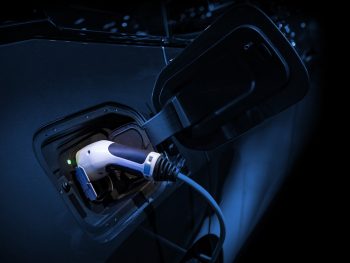Surging fleet sales propel new car market near pre-pandemic levels
New car registrations rose 9.5% year-on-year in November, driven entirely by soaring uptake from larger fleets.

Of the 24,359 new BEVs reaching the road in November, 77.4% were taken on by fleets and businesses
Registrations last month reached 156,525 units, according to new figures from the Society of Motor Manufacturers and Traders (SMMT) – just 0.1% down on pre-pandemic levels.
Larger fleets were the hero of the month. Registrations by operators with 25 vehicles or more rose 25.4% to account for 93,049 units and 59.4% of the market.
Among smaller ‘Business’ fleets – with fewer than 25 vehicles – registrations fell 32.7% to 2,970 units.
Combined fleet registrations soared to 96,019 units; up 22.2% on November 2022 and accounting for 61.3% of the overall market compared to 55% a year ago.
It was a different story though for private registrations, which fell 5.9% to 60,506 registrations as cost-of-living pressures continued to take their toll.
Year to date, the overall market remains up 18.6% at 1.762 million units, as the return to growth in the corporate market helped propel the continued market recovery.
Fortunes for the electric vehicle sector were mixed.
Take-up of hybrid electric vehicles (HEVs) and plug-in hybrid vehicles (PHEVs) soared, rising by 27.8% and 55.8% respectively. HEVs held a 13.2% market share last month (11.2% for November 2022) while PHEVs were to 10.1% from 7.1% a year ago.
In contrast, registrations of battery electric vehicles (BEVs) fell by 17.1%, leading to a reduced market share of 15.6%, compared to 20.6% last year.
The SMMT pointed out that last November was atypical with significant deliveries following supply chain disruptions. Year to date, BEV uptake is up 27.5% with a 16.3% market share – expected to rise to 22.3% next year, driven by the new ZEV mandate.
But the SMMT warned that BEV uptake continues to be led by fleets; of the 24,359 new BEVs reaching the road in November, 77.4% were taken on by fleets and businesses.
And with the ZEV mandate that comes into force in January mandating that 22% of each manufacturer’s new vehicle registrations must be zero emission, it added that sustained recovery depends on inspiring consumers with fiscal incentives, as well as greater investment in essential charging infrastructure that gives drivers confidence.
It’s urging the Government to halve VAT on new BEVs and reduce VAT on public charging to 5% in line with home charging, in order to increase the attractiveness of driving electric and make the zero-emission transition more accessible to a larger number of consumers.
Even more pressing is the need to delay tougher new UK–EU Rules of Origin, which will also take place from 1 January 2024. Unless the UK and EU agree to postpone these rules, EVs traded both ways will incur tariffs that would raise prices for consumers at a critical moment in the transition.
With less than four weeks to go, carmakers and governments on both sides of the Channel have called for a common-sense approach to retain the current EV battery rules for a further three years, which will support consumer choice and affordability.
Mike Hawes, SMMT chief executive, commented: “Britain’s new car market continues to recover, fuelled by fleets investing in the latest and greenest new vehicles. With car makers gearing up to meet their responsibilities under new market legislation, and COP28 currently underway, now is the time to take sensible steps that will multiply that economic growth and minimise carbon emissions. Private EV buyers need incentives in line with those that have so successfully driven business uptake – and workable trade rules that promote rather than penalise the transition.”
Decline in BEV registrations shows much more work needed

Public charging infrastructure, including kerbside charging, remains a key stumbling block for private drivers and commercial fleet managers
Many industry commentators have called for more support for consumer take-up of EVs.
Jamie Hamilton, automotive partner and head of electric vehicles at Deloitte, said: “In a month where we’ve seen significant announcements in the UK supporting electric vehicle production, the decline in sales of battery electric vehicles in November is a reminder that we also need to think about demand and the underlying charging infrastructure that’s required for consumer adoption.
“More clarity on residual values and a better second-hand car market for EVs will also help boost demand for new cars.
Gav Murray, EV director at British Gas, said: “It remains clear that electric vehicles hold great appeal for UK drivers and businesses, but much work remains to be done before they are accessible to all. According to the UK Electric Fleets Coalition, almost one in three UK households have no access to off-street parking, so ample publicly available charging infrastructure, including kerbside charging, will be essential to make the switch to an EV a reality. This is a key stumbling block not only for private vehicle ownership, but also for commercial fleet managers, who often need employees to be able to charge vehicles off-site and at home. That’s why we, along with a coalition of leading UK businesses, are calling for the Government to accelerate its efforts to make EV charging available to everyone who will need it.”
MAF Finance Group also commented. Chris Leslie, commercial director, said: “The lack of adequate off-street parking, fast chargers and access to private charging points clearly remain significant barriers for consumers making the transition and the high cost entry point, coupled with one of the worst cost-of-living crisis in decades, may only worsen demand.”
And finally, Ken McMeikan, CEO of Moto Hospitality, said: “Today’s disappointing EV sales figures clearly show that what the UK needs is a government that is committed in its approach to encouraging and incentivising more people to transition to electric cars.
“While the figures are a setback, we are hopeful that if the Government acts swiftly on its decision to transform the planning system in favour of delivering low-carbon energy projects and prioritise EV charging hubs, then this short-term trend will start to reverse.
“However, to make accelerated progress with EV adoption it is critical that the Government prioritises power to motorway service areas to transform the number of EV chargers that are available to overcome ‘range anxiety’, which is the second biggest reason people are reluctant to switch to an electric car.
“Moto alone requires 12 times the amount of the power we dispense today, by 2030, and the planning changes are likely to take too long to affect delivery of power over the next two to three years. I am urging the Government to accelerate the availability of sufficient power to major travel hubs such as motorway service areas and to declare the strategic road network as a national priority for power.”












